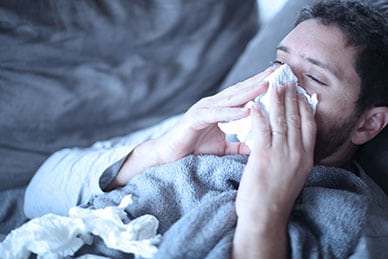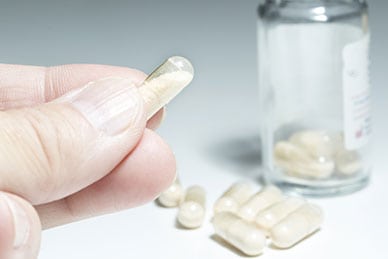In general, men are often perceived as being the physically stronger (and thus possibly healthier) gender. However, their response to infectious illness appears to be an exception to the rule. Many people over time have noted that men subjectively report worse symptoms from colds, cases of the flu and other illnesses. The same illness that most women will work through can leave men bed-ridden for days. Is there a difference in the immune systems of the sexes? A new study has weighed in on the man flu and appears to have surprising results.
Do Men Really Get Sicker?
Many sitcom episodes have been written about the different response that men and women have on average to colds and illnesses. However, it is not humorous for many couples. This is a very real source of tension for many couples, particularly when both are ill and the woman is left with the majority of household duties while the man stays in bed. Dr. Kyle Sue decided to look at this issue more closely to determine if there is a biological cause.
Dr. Sue found several studies indicating a difference in the immune systems of men and women. Women have a greater response to the flu shot and report more side effects, which suggests a stronger immune system. They also are less likely to be hospitalized for influenza and other infectious diseases according to a study in Hong Kong. Last, men subjectively report worse symptoms than women—which is unsurprising to many. The study’s authors concluded rather controversially that many men simply need more care and nurturing when they are ill.
Differences in the Male and Female Immune System
 Although this study has been a source of amusement for many people, there appear to be very real differences between male and female immune systems. Studies on mice have found that female immune systems are indeed more responsive than male ones. While this leaves women at a higher risk of autoimmune disease, it also can give them additional protection against bacteria and viruses.
Although this study has been a source of amusement for many people, there appear to be very real differences between male and female immune systems. Studies on mice have found that female immune systems are indeed more responsive than male ones. While this leaves women at a higher risk of autoimmune disease, it also can give them additional protection against bacteria and viruses.
In addition, testosterone appears to work to suppress the immune system. Men with higher testosterone levels overall have less immunity after vaccinations. Testosterone is the primary hormone associated with male traits, so this factor alone may have a significant impact on how often men get sick as well as the severity of their symptoms. In addition, estradiol, an equivalent female hormone, appears to act instead to stimulate the immune system and keep women from getting sick as often.
Is the Man Flu a Myth?
Dr. Sue of the recent study on male immunity feels that men’s notorious behavior when ill may have an evolutionary origin. Because men traditionally hunted, being even mildly ill could be life-threatening. Staying in bed and seeking pampering and care from one’s partner might have saved many lives. He argues that men need this nurturing so they can heal and get back to their duties more quickly.
Although many women obviously feel that the man cold or flu is a myth, there is nothing wrong with providing loving care for a partner when they are ill. If men can also take the time to pamper sick girlfriends and wives, many couples will be happier indeed. More studies will need to be performed to determine if there are truly meaningful differences in female and male immune systems, but the current research is interesting indeed.
Keeping High Immunity in Cold and Flu Season
Regardless of your gender, there are several ways that you can prevent illness this winter. Consider incorporating the following habits into your life:
- Wash hands often to keep germs on surfaces from causing illness.
- Avoid putting your hands near your face where germs can easily enter the body.
- Take a multivitamin to help keep your immune system running in peak form.
- Avoid sick people and extremely crowded places where contact with viruses may be inevitable.
- Spend more time outside to avoid the high concentration of germs in indoor spaces during cold weather months.
- Consider taking vitamin C, zinc, and other supplements associated with immunity if you have been exposed to an illness or are feeling under weather.
- Stay home when you are sick or wear a face mask to avoid spreading your own illnesses.
- Get plenty of restorative sleep.
There is no way to know if men truly are hit harder by infectious illnesses than the women in their lives. However, both sexes should make it a priority to prevent illness and to nurture each other through them. While many men probably could be more functional when they are sick, staying in bed and nurturing yourself is actually the best way to handle a cold or flu.
 How can gut flora affect allergies and the immune system? Researchers are still looking for root causes, but a few findings have solved part of the puzzle. Gut bacteria act as the first line of defense against any dangerous things we may ingest. They maintain an environment where
How can gut flora affect allergies and the immune system? Researchers are still looking for root causes, but a few findings have solved part of the puzzle. Gut bacteria act as the first line of defense against any dangerous things we may ingest. They maintain an environment where  It seems counter-intuitive that eating a high fat, high cholesterol food could lower cardiovascular disease risk. However, cheese is not only made of fat and cholesterol. It also is a rich source of nutrients that are often lacking in the modern diet. Cheese is a rich source of
It seems counter-intuitive that eating a high fat, high cholesterol food could lower cardiovascular disease risk. However, cheese is not only made of fat and cholesterol. It also is a rich source of nutrients that are often lacking in the modern diet. Cheese is a rich source of  Phytoestrogens are a subgrouping of what is medically referred to as phytohormones. Typically, these substances are produced by and found in plants, most notably in many of the fruits and vegetables people consume as part of their diets. Examples include produce like garlic, parsley, soybeans and soy products, carrots, kale, broccoli, potatoes, dates, cherries, apples, pomegranates, sunflower seeds, sesame seeds, grain products and coffee beans. Among the two most studied and well-known types of
Phytoestrogens are a subgrouping of what is medically referred to as phytohormones. Typically, these substances are produced by and found in plants, most notably in many of the fruits and vegetables people consume as part of their diets. Examples include produce like garlic, parsley, soybeans and soy products, carrots, kale, broccoli, potatoes, dates, cherries, apples, pomegranates, sunflower seeds, sesame seeds, grain products and coffee beans. Among the two most studied and well-known types of  Like isoflavones, the phytoestrogens known as lignans are thought to provide added protection in the fight against various forms of cancer, as well as aid in the reduction of cholesterol levels. However, scientists believe these chemicals possess
Like isoflavones, the phytoestrogens known as lignans are thought to provide added protection in the fight against various forms of cancer, as well as aid in the reduction of cholesterol levels. However, scientists believe these chemicals possess  The human body is teeming with other life—microorganisms inside and outside the body outnumber our one cells 10-to-one. The digestive tract, in particular, is home to a complex ecosystem of bacteria. The gut microbiome, as it is often called, has been the subject of
The human body is teeming with other life—microorganisms inside and outside the body outnumber our one cells 10-to-one. The digestive tract, in particular, is home to a complex ecosystem of bacteria. The gut microbiome, as it is often called, has been the subject of  There is a well-established link between the microbiome and eczema. Research has found that
There is a well-established link between the microbiome and eczema. Research has found that  There are several factors that contribute to depression in the darker months of the year (the causes of summertime depression are much less understood). Serotonin is a neurotransmitter highly responsible for maintaining a normal mood; production of this chemical is partly triggered by sunlight exposure. Since there is much less sunlight during the fall and winter, serotonin levels can plummet. Less sunlight also means less
There are several factors that contribute to depression in the darker months of the year (the causes of summertime depression are much less understood). Serotonin is a neurotransmitter highly responsible for maintaining a normal mood; production of this chemical is partly triggered by sunlight exposure. Since there is much less sunlight during the fall and winter, serotonin levels can plummet. Less sunlight also means less